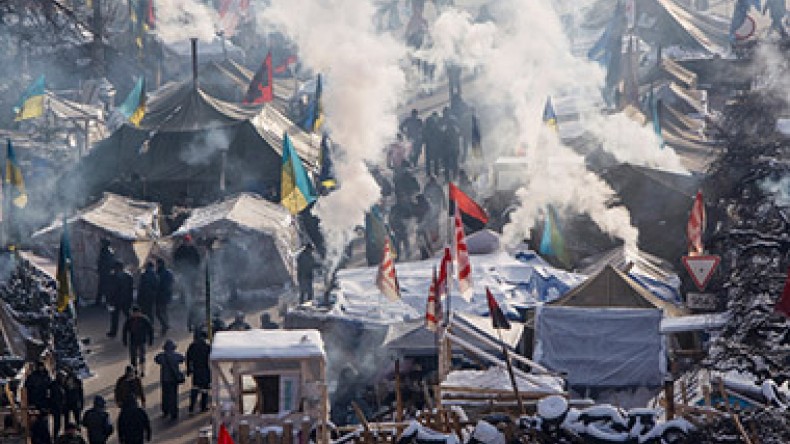
‘Very irresponsible’ to hold early elections in Ukraine
As violence between radical opposition and police continues in the Ukrainian capital, calling early elections will only make things worse, Martin Sieff, a global policy expert, told RT.
“The early elections will make things worse. It’s a very bad solution, very irresponsible,” Sieff told RT.
Daniel McAdams, executive director at Ron Paul Institute for peace and prosperity, shares this point of view, saying that elections can’t be held with the situation as it is in Ukraine now.
“I’ve been an election monitor in early ’90s in many contentious areas. You simply cannot hold elections in an environment of violence like this. It’s virtually impossible to do,” McAdams told RT.
“How is there any democratic legitimacy to having a mob on the streets demanding new elections?” he added.
The experts' opinion echoes that of the Ukrainian Prime Minister Nikolay Azarov, who made a statement at the Davos forum, claiming it is ‘unconstitutional’ to hold an early election. However, he claimed that the government is ready to resign if the parliament votes for this.
At the same time the Ukrainian President Viktor Yanukovich conducted a new round of talks with opposition leaders on January 23. If the protesters agreed to leave the area in central Kiev the authorities were ready to stop the use of force, release all those detained during mass riots on Grushevskogo Street, and consider reduced penalties for protesters who have already been arrested. The opposition leaders initiated a public vote at Independence Square and the majority of the protesters refused to accept the government's conditions.
Commenting on the current situation in Kiev, Martin Sieff says that there are no peaceful protesters any more, whereas rioters are stimulated by the Western support.
“We do not see peaceful protesters in Ukraine. We see highly organized violent protesters being encouraged by very irresponsible actions primarily of many European Union nations. It’s extremely unprecedented and extremely dangerous,” he said.
Daniel McAdams agrees, saying that “the protesters have become more radicalized because they have been encouraged all alone by EU and American politicians, who have been on the ground in the middle of the protests encouraging them.”
“There are certainly plenty of blames that go to the EU and American politicians like the US Assistant Secretary of State Victoria Nuland, who was handing out cookies at the square. And we all know her husband, the great neo-con Robert Kagan, who's in favor of revolutions all over the world, the former advisor to John McCain. So these people know all about the revolutions and favor them, and they have to share some of the blame for the bloodshed,” he told RT.
Talking about the anti-protest law enacted by the Ukrainian government on January 16, which is believed to be a reason for the renewed unrest, Martin Sieff says that “the constraints under the new Ukrainian law are virtually identical to the laws of the US, and many European countries have harsher laws.”
“Ukraine has not abandoned its democracy with its new laws, it is the violence in the streets that is threatening democracy in Ukraine. Any stable democracy is not decided on the streets, it is decided by due protest,” Sieff said.
McAdams gives examples of the analogous anti-protest law operating in the United States, in particular, in Washington, DC.
“And it’s all blamed on this new anti-protest law, which is virtually identical to any law you would see in the US. In Washington, DC, you are not allowed to wear a mask during protests, you are not allowed to have a tent, which was during the Occupy Wall Street violently turned down. You are not allowed have foreign funding of your political organization in the US, it’s illegal,” McAdams said.
He also argues that the high level of violence that can be seen in Kiev during the week is to be blamed on the rioters.
“Certainly the protesters are to blame [for violence]. The police are using violence – that’s what the police do everywhere when they have to break up protests like this,” McAdams told RT.
“There is an interesting symbiosis between people like Klitschko, who is seen in the US as a great opposition leader, and his radical provocateurs in the street, who are setting policemen on fire, throwing grenades at policemen, throwing rocks at them. Where in the world would this be tolerated?” he added.
Newsfeed
Videos






























